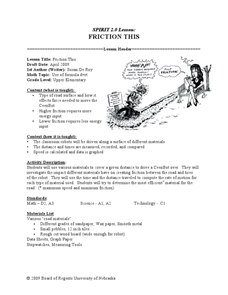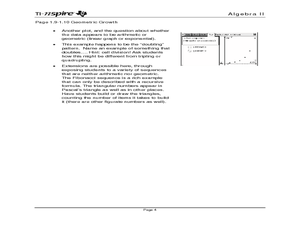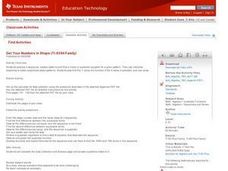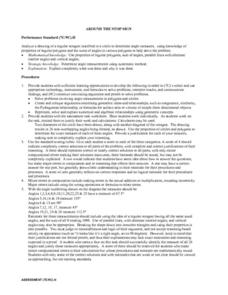Curated OER
The Closer I Get To You
Pupils explore the law of reflection. Through experimentation and problem solving, they collect and analyze data pertaining to reflection. The data is plotted on a graph and formulas for calculating the x and y values are evaluated.
Curated OER
Friction This
Students investigate road surface and calculate speed. In this algebra lesson, students analyze the roughness of a road and calculate distance and speed based on friction. They relate friction and energy to speed.
Curated OER
Practice Chapter Test
For this algebra worksheet, students identify the property being used in each problem. They plot numbers on a number line. There are 30 questions.
Curated OER
You Can Count on Squares!
Fourth graders engage in and explore to develop mathematical, specifically algebraic, ideas. Although the tasks are built around measurement, they are algebraic to the extent that they require 'formulae' to be derived form the geometric...
Curated OER
The Box with the Greatest Volume
Students use measurement tools to measure the nearest 16th of an inch. They connect fractions and their decimal equivalents and compare this with other decimals. Finally, the class uses algebraic concepts and formulas to solve problems.
Curated OER
Linear Equations
Ninth graders solve linear equations. In this Algebra I lesson, 9th graders investigate the properties of equations (Reflexive, Symmetric, Transitive, Substitution, and Transformation Properties) and use these properties to solve...
Curated OER
Cruising the Internet
Students identify the parts of an engine using a graph. In this statistics lesson, students make a graph from their collected data. They calculate the volume of a cylinder using a line of regression and a scatter plot.
Curated OER
Sectors of Pizza
Young scholars identify the properties of a circle. In this geometry lesson, students relate properties of diameter to sections of a pizza. They calculate the measure of an arc and missing angles.
Noyce Foundation
Which is Bigger?
To take the longest path, go around—or was that go over? Class members measure scale drawings of a cylindrical vase to find the height and diameter. They calculate the actual height and circumference and determine which is larger.
Curated OER
Forms of Quadratic Equations
Transformations of parabolas to fit a particular quadratic equation is taught through this lesson. In this transforming parabolas to fit a particular quadratic equation lesson, high schoolers describe the transformations of the...
Curated OER
Systems of Equations and Real Life
What a great classroom resource! The intention of this lesson is to show that real-world math can and should be applied to the community in which your students reside. The class relates properties of equations to solving for species...
Curated OER
Discovering Pi
Define terminology related to a circle. Practice accuracy in measuring and then create a spreadsheet based on data collected from solving for parts of a circle. Groups can have fun analyzing their data as it relates to Pi.
Mathematics Assessment Project
Designing a 3d Product in 2d: a Sports Bag
Sew up pupil interest with an engaging, hands-on lesson. Learners first design a sports bag given constraints on the dimensions of fabric. They then evaluate provided sample responses to identify strengths and weaknesses of included...
Curated OER
What's the Frequency, Roy G. Biv?
Introduce starting space scientists to the electromagnetic spectrum, expecially the portion of visible light. Teach them about wavelength and frequesncy. Then give them a roll of adding machine tape and a manila folder to make a...
Curated OER
Fences and Posts
Fifth graders use Geoboards to demonstrate how shapes can be made by looping the rubber bands over the nails. They make a triangle on their Geoboards. At least one side of the triangle should be either horizontal or vertical. The picture...
Shodor Education Foundation
Volume of Prisms
Explore the concept of volume of prisms using an applet to perform the calculations. The link to the interactive applet is embedded into the lesson plan as well as a link to associated data sheets. Get your math class to the computer lab...
Curated OER
Maps and Modes, Finding a Mean Home on the Range
Fifth graders investigate data from maps to solve problems. In this data lesson, 5th graders study maps and collect data from each map. Students present their data in a variety of ways and calculate the mode, mean, median, and range.
Curated OER
Carbon Dating
Simulate C-14 decay using M&M and Reese's Pieces candies. For this scatter-plot lesson, students perform an experiment to simulate the half life of C-14. Information is plotted on a scatter-plot. Students answer four comprehension...
Curated OER
Using Excel To Teach Probability And Graphing
Students engage in the use of technology to investigate the mathematical concepts of probability and graphing. They use the skills of predicting an outcome to come up with reasonable possibilities. Students also practice using a...
Curated OER
Sequence Graphs
Investigate arithmetic and geometric sequences by using a graphing calculator to determine if a sequence is linear or exponential.
Curated OER
Permutations
Learn how to solve the probability that an event will occur. Learners also employ permutations and combinations to find the amount of time it takes for an event to occur. They use the Ti to create a visual of the events.
Curated OER
Who Wants to Carry a Million?
Young scholars, in groups, determine the volume of a box large enough to hold a million dollars. They calculate the dimensions of a bill and the volume of the money.
Curated OER
Get Your Numbers in Shape - TI-83
High Schoolers use the TI-83 calculator to produce a sequence, explore patterns and find a linear or quadratic equation for a given pattern. They use inductive reasoning to make conjectures about patterns. They find the Y-value of a...
Curated OER
Around The Stop Sign
Students analyze a drawing of a regular octagon inscribed in a circle to determine angle measures, using knowledge of properties of regular polygons and the sums of angles in various polygons to help solve the problem. They use...























